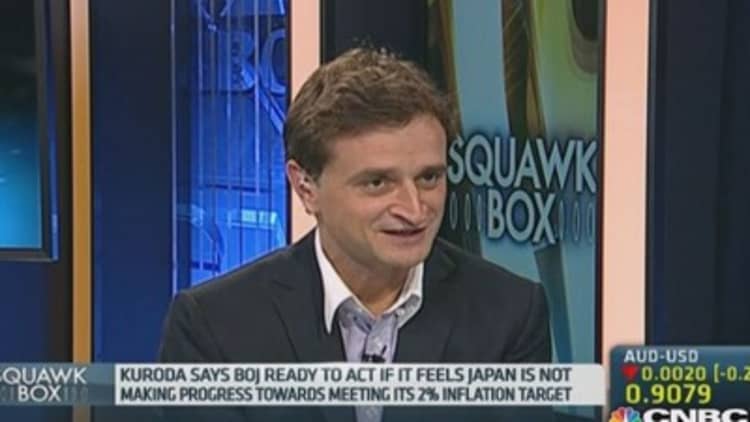While the yen's sharp drop over the past two days has driven the Nikkei to near seven-year highs, the currency's quick decline is also spurring concerns over Japan's economic outlook.
"The main worry if the yen continues to weaken is inflation," said Edwin Merner, president at Atlantis Investment Research.
Read More Why Japan's economy is stuck in 'no man's land'
The U.S. dollar was fetching as much as 109.46 yen intraday Friday, marking a six-year low for the Japanese currency, before the pair retreated to trade around 109.13. Early Wednesday, the U.S. dollar was fetching around 107.14.
"The government would like some inflation, but their idea of inflation is higher demand," he said. "If you have higher costs without a lot of increase in demand, that would not be good. That may spur people to buy less."

In addition, while a weaker yen is generally considered good for the country's exporters as it makes their products more attractive overseas, "exporters also buy raw materials, and that could mean higher prices," he said, noting that Japan's biggest import is energy, which is priced in U.S. dollars.
Merner believes that if the yen continues to weaken, it may affect demand for Japanese government bonds (JGBs).
"If you have inflation, then people want higher interest rates," he said. "Even though you've seen rather bad returns on government bonds, the fact that until recently there was no inflation [meant] you were getting real returns."
Read More Japan inflation rises in July but remains short of BOJ target
He expects that if the yen continues to weaken, authorities may intervene, but he isn't sure what level would spur action.
The speed of the yen's rise is another concern, with Reuters reporting that Japan's economy minister Akira Amari said rapid moves in currencies are undesirable.
"It's very fast," said Greg Gibbs, senior foreign exchange strategist at RBS. "It's caught a lot of global investors on the hop," he added, citing wide expectations that the pair would remain range bound.
Read More Japan stocks set to ride new wave of yen weakness
But Gibbs believes the yen is catching up to its fundamentals, including a deteriorating external balance, rising inflation, falling yields and rapid policy easing as well as increasing expectations that GPIF, the government pension investment fund, will decrease its allocations to JGBs as it increases allocations to risky assets.
Shinzo Abe, Japan's prime minister, on Friday said he expect to carry out reforms at GPIF as soon as possible, according to a Reuters report.
Others also have concerns about the yen's decline, but are keeping a tempered view.
Read More Japan shows sharp contraction in second quarter
"What Japan needs from here is a very lengthy period of a competitive currency, not a currency crash," Kit Juckes, global macro strategist at Societe Generale, said in a note Thursday.
But he doesn't see any reason for the currency to continue to weaken toward 120 against the dollar, as some expect.
"That would push inflation up, rather than keep it around current levels and would undermine real wages," he said. "While we will probably now see a push towards that 110 area, we may well that find a new trading range centered around current levels."
—By CNBC.Com's Leslie Shaffer; Follow her on Twitter @LeslieShaffer1


